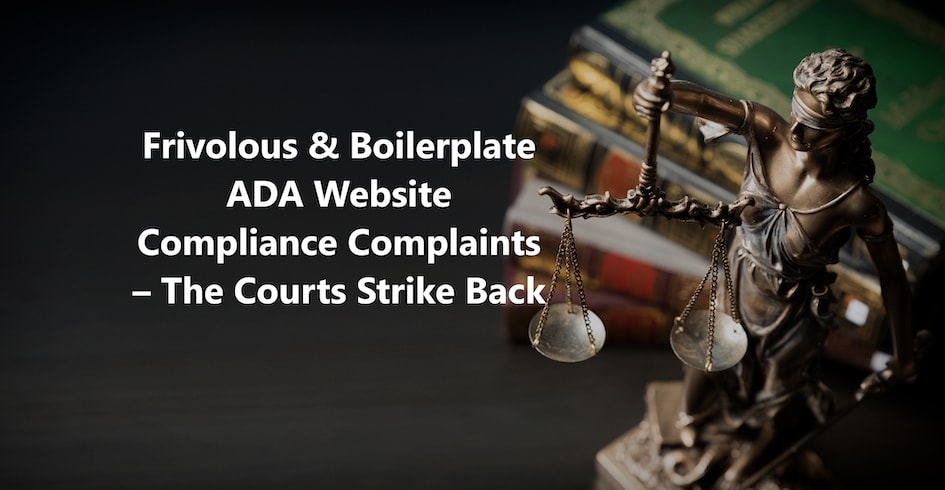First things first ….
We are strong proponents of website accessibility compliance. The bigger your audiences and the more critical your products and services the more important it becomes. We all agree that it is vitally important that government, financial, healthcare, and utility websites should meet the highest level of accessibility. Failing to do so poses risks of limiting or denying access to those who most rely on their service. And virtually all business websites should achieve reasonable levels of compliance.
That why we have the Americans with Disabilities Act (ADA). It’s there to make sure that reasonable accessibility is achieved for as many people as possible.
What Is Reasonable ADA Compliance for Websites?
We don’t have to guess. There is an internationally accepted standard documented by the organization W3C (W3.org) and they have created standards for businesses and organizations to help them understand what it means to have an accessible website relative to their size and industry segment. This set of guidelines is called the Web Content Accessibility Guidelines (WCAG). In it they have ranked compliance levels as A, AA, and AAA and documented what it means to comply with each one.
No Good Deed Goes Unpunished
There are a few issues that need to be navigated. For example, in addition to national and international compliance guidelines, here in the United States the individual states have adopted their own laws and compliance rules. Most of these generally follow the WCGA and ADA guidelines with a few minor reporting or business-size qualification variations.
But like all things, there are always those who seek to personally profit from an imbalance of information or an accidental misstep. There has been a rash of legal-threat letters and even full lawsuits filed against small businesses who have accidentally stumbled into some form of noncompliance. And, in some cases, the small business has NOT been out of compliance at all and the legal threat has been a form of judicial blackmail to make the business pay-off rather than defend. These are often referred to as “nuisance” lawsuits.
In the worst instances, shady legal operators have set disability traps and paid people to look for unsuspecting small businesses who have not had any accessibility issues experienced by anyone at all or they made completely and demonstrably false claims of non-compliance because the site never was visited by anyone associated with the lawsuits at all. These businesses received “boilerplate” lawsuits. There have even been multiple cases where a website has been largely in compliance and had detailed accessibility programs in place, but a single error or missed link or image has resulted in a threat of legal action.
This is NOT what the ADA or WCGA is supposed to be used for. These programs aren’t “gotcha” traps. They are designed to encourage and facilitate cooperation and compliance. A business or organization that is aware, largely compliant, and/or actively taking steps to remediate any issues should not be punished or sued. And businesses that are not compliant should be given an opportunity to come into compliance instead of wasting resources on a legal defense. Like in all things, the courtroom should be an option of last resort.
Good News for Business Websites & ADA Compliance
It seems that some jurisdictions are starting to take notice of the problem and are pushing back. There have been a few recent cases where judges have recognized the frivolous nature of some of these complaints and have pushed back. Notably, cases in New York and Riverside, California (as reported by steptoe.com), have rendered complaints moot (ineffectual) if:
- The business undertook compliance with the WCAG standards before the lawsuit was filed.
- The website is presently compliant.
- The business confirmed via affidavit that the specific barriers/complaint had been addressed.
- The defendant has no intention of un-doing the changes and planned to keep their website compliant.
That judge also stated that filing duplicate complaints against different businesses was not necessarily wrong. But ONLY if the actual complaint issues were identical. And in websites that is almost never the case because no two websites have the same number of images, links, colors, code, etc. In short, since all websites are a bit different, filing identical (boilerplate) complaints does not make sense.
This is good news. We’ll keep you updated as this important issue progresses.
Need Help or Info on Website Compliance?
We have helped dozens of government, healthcare, and enterprise organizations achieve and maintain website compliance. If you want, there are specific test we can run that can show where your website needs to improve in order to comply. If you need help with ADA and WCAG compliance on your website. Just let us know (contact us). We are always happy to help.
